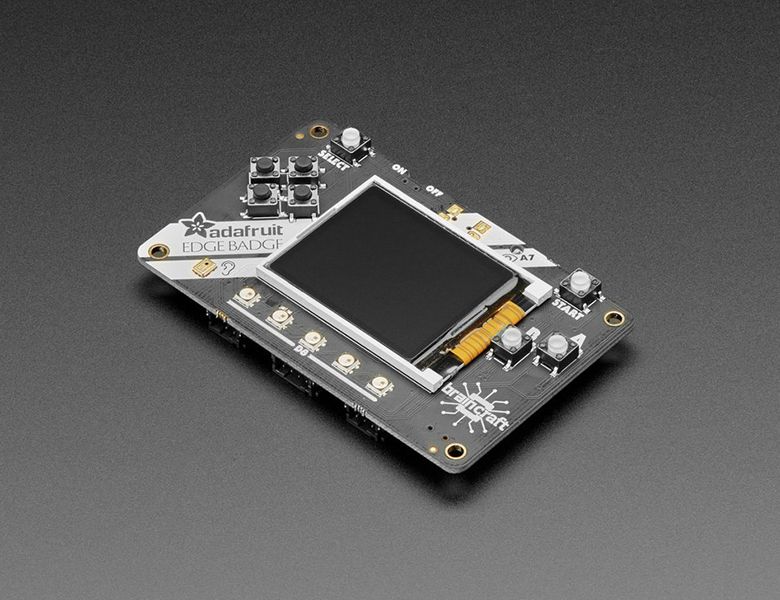
EdgeBadge by Adafruit
Machine learning has come to the ‘edge’ - small microcontrollers that can run a very miniature version of TensorFlow Lite to do ML computations.
But you don’t need super complex hardware to start developing your own TensorFlow models! We’ve adapted our popular PyBadge board to add a microphone so you can dip your toes into machine learning waters. It does everything that the PyBadge does, and as we make more projects that use Machine Learning we’ll adapt this board to make it better and better for machine learning.
The EdgeBadge is a compact board - it’s credit card sized. It’s powered by our favorite chip, the ATSAMD51, with 512KB of flash and 192KB of RAM. We add 2 MB of QSPI flash for file storage, handy for TensorFlow Lite files, images, fonts, sounds, or other assets.
We’ve added a PDM microphone on the front as an input for micro speech recognition. Our Arduino library has some demos you can get started with to recognize various word pairs like “yes/no”, “up/down” and “cat/dog”. TensorFlow Lite for microcontrollers is very cutting-edge so expect to see a lot of development happening in this area, with lots of code and process changes.
You can code the EdgeBadge with: CircuitPython, MakeCode Arcade, TensorFlow Lite for Microcontrollers / Arduino, and more!
Purchase
Contribute
Have some info to add for this board? Edit the source for this page here.
CircuitPython 9.2.8
This is the latest stable release of CircuitPython that will work with the EdgeBadge. Use this release if you are new to CircuitPython.
Modules included in this download
_asyncio _bleio _pixelmap _stage adafruit_bus_device adafruit_pixelbuf alarm analogio array atexit audiobusio audiocore audioio audiomixer audiomp3 binascii bitbangio bitmaptools board builtins builtins.pow3 busdisplay busio busio.SPI busio.UART codeop collections countio digitalio displayio epaperdisplay errno fontio fourwire frequencyio getpass i2ctarget io json keypad keypad.KeyMatrix keypad.Keys keypad.ShiftRegisterKeys locale math microcontroller msgpack neopixel_write nvm onewireio os os.getenv ps2io pulseio pwmio rainbowio random re rotaryio rtc samd sdcardio select storage struct supervisor synthio sys terminalio tilepalettemapper time touchio traceback ulab usb_cdc usb_hid usb_midi vectorio warnings watchdog zlibIncluded frozen(?) modules: stage, ugame
Features: Display, Speaker, Feather-Compatible, Battery Charging
CircuitPython 10.0.0-alpha.7
This is the latest development release of CircuitPython that will work with the EdgeBadge.
Alpha development releases are early releases. They are unfinished, are likely to have bugs, and the features they provide may change. Beta releases may have some bugs and unfinished features, but should be suitable for many uses. A Release Candidate (rc) release is considered done and will become the next stable release, assuming no further issues are found.
Please try alpha, beta, and rc releases if you are able. Your testing is invaluable: it helps us uncover and find issues quickly.
Release Notes for 10.0.0-alpha.7
Modules included in this download
_asyncio _bleio _bleio (HCI co-processor) _pixelmap _stage adafruit_bus_device adafruit_pixelbuf alarm analogio array atexit audiobusio audiocore audioio audiomixer audiomp3 binascii bitbangio bitmaptools board builtins builtins.pow3 busdisplay busio busio.SPI busio.UART codeop collections countio digitalio displayio epaperdisplay errno fontio fourwire frequencyio getpass i2ctarget io json keypad keypad.KeyMatrix keypad.Keys keypad.ShiftRegisterKeys locale math microcontroller msgpack neopixel_write nvm onewireio os os.getenv ps2io pulseio pwmio rainbowio random re rotaryio rtc samd sdcardio select storage struct supervisor synthio sys terminalio tilepalettemapper time touchio traceback ulab usb_cdc usb_hid usb_midi vectorio warnings watchdog zlibIncluded frozen(?) modules: stage, ugame
Features: Display, Speaker, Feather-Compatible, Battery Charging
Absolute Newest
Every time we commit new code to CircuitPython we automatically build binaries for each board and language. The binaries are stored on Amazon S3, organized by board, and then by language. These releases are even newer than the development release listed above. Try them if you want the absolute latest and are feeling daring or want to see if a problem has been fixed.
Previous Versions of CircuitPython
All previous releases of CircuitPython are available for download from Amazon S3 through the button below. For very old releases, look in the OLD/ folder for each board. Release notes for each release are available at GitHub button below.
Older releases are useful for testing if you something appears to be broken in a newer release but used to work, or if you have older code that depends on features only available in an older release. Otherwise we recommend using the latest stable release.
Update UF2 Bootloader
Latest version: v3.16.0
The bootloader allows you to load CircuitPython, MakeCode, and Arduino programs. The bootloader is not CircuitPython. You can check the current version of your bootloader by looking in the INFO_UF2.TXT file when the BOOT drive is visible (FEATHERBOOT, CPLAYBOOT, etc.).
It is not necessary to update your bootloader if it is working fine. Read the release notes on GitHub to see what has been changed. In general, we recommend you not update the bootloader unless you know there is a problem with it or a support person has asked you to try updating it.
To update, first save the contents of CIRCUITPY, just in case. Then double-click the reset button to show the BOOT drive. Drag the update-bootloader .uf2 file to the BOOT drive. Wait a few tens of seconds for the bootloader to update; the BOOT drive will reappear. After you update, check INFO_UF2.TXT to verify that the bootloader version has been updated. Then you will need to reload CircuitPython.
